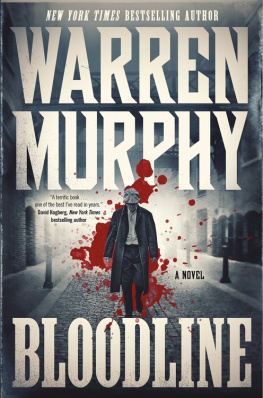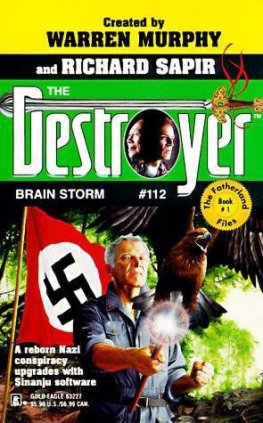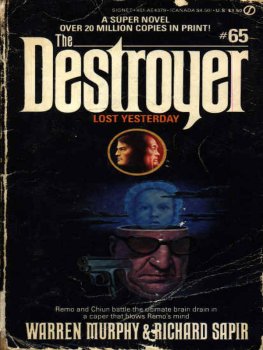Warren Murphy - Engines of Destruction
Here you can read online Warren Murphy - Engines of Destruction full text of the book (entire story) in english for free. Download pdf and epub, get meaning, cover and reviews about this ebook. genre: Science fiction. Description of the work, (preface) as well as reviews are available. Best literature library LitArk.com created for fans of good reading and offers a wide selection of genres:
Romance novel
Science fiction
Adventure
Detective
Science
History
Home and family
Prose
Art
Politics
Computer
Non-fiction
Religion
Business
Children
Humor
Choose a favorite category and find really read worthwhile books. Enjoy immersion in the world of imagination, feel the emotions of the characters or learn something new for yourself, make an fascinating discovery.

- Book:Engines of Destruction
- Author:
- Genre:
- Rating:4 / 5
- Favourites:Add to favourites
- Your mark:
- 80
- 1
- 2
- 3
- 4
- 5
Engines of Destruction: summary, description and annotation
We offer to read an annotation, description, summary or preface (depends on what the author of the book "Engines of Destruction" wrote himself). If you haven't found the necessary information about the book — write in the comments, we will try to find it.
Engines of Destruction — read online for free the complete book (whole text) full work
Below is the text of the book, divided by pages. System saving the place of the last page read, allows you to conveniently read the book "Engines of Destruction" online for free, without having to search again every time where you left off. Put a bookmark, and you can go to the page where you finished reading at any time.
Font size:
Interval:
Bookmark:
Destroyer 103: Engines of Destruction
By Warren Murphy and Richard Sapir
Chapter 1
Nobody knew when it all started, because it had been going on since the days of Casey Jones. Nobody thought it unusual, because it was as common as a caboose. No one knew when it would end, because as long as man set hurtling engines on ribbons of steel rail, derailments were inevitable. And no one saw a sinister pattern emerge in the waves of rail accidents, because from the earliest days of steam locomotives there had always been rail accidents. Some years there were more. Some years less.
For three unrelenting years there were more. Many more.
Rail fans, train crews and transportation experts alike said the nation's aging rail system was approaching critical mass.
The National Transportation Safety Board blamed engineers on drugs, aging and downgraded tracks, poor maintenance and just plain dumb-ass bad luck.
Everyone agreed that Amtrak was experiencing the worst of the rash of derailments. In three grim years more than one hundred Amtrak passengers had died-more combined fatalities than the nation's passenger rail service had suffered since its inception twenty-five years before.
The fact that Amtrak's cars were filled with passengers, while freight handlers hauled inert commodities, was ignored. As was the fact that the average passenger train hauled a lot more passengers that the average passenger jet. Naturally a train wreck could be more deadly than a plane crash. But they never were. More people walked away from train crashes than died. Nobody could say the same when a 747 cratered. Yet whenever an Amtrak train careened off its rails, it made the front page, not the third section. They weren't hauling cabbages, after all.
The experts all agreed that if you took Amtrak out of the statistical loop, rail traffic was as safe as it ever had been.
Which, if you knew the history of rail, had a lot to do with where you sat.
TY HURLEY SAT in the cab of a new Southern Pacific MK5000C freight hauler, his left hand on the throttle, his right goosing the independent brake as he chased the twin uncatchable gleams of starlight racing ahead of him along a curving stretch of rail approaching Big Sandy, Texas.
The cab vibrated to the deep baritone thunder of the twenty-five-ton Caterpillar 3612 diesel while Ty watched the brake pressure and RPM readouts seesaw on the liquid-crystal display screen buried in the cream-colored molded plastic of the instrument panel. Not twenty feet at his back, under four toiling, yellow-bladed exhaust fans, five thousand horses galloped in concert, but it felt wrong. All wrong.
Ty Hurley hadn't become an engineer to sit in climate-controlled comfort, sucking down polyurethane smell, insulated from the big four-stroke monster-block V-12 prime mover he controlled through a careful balancing of power and braking. This was not railroading. This was not his dream.
He missed the industrial black control panel of his old SD40-2 diesel, with its analog dials and ineffective wall fan laboring to circulate the stale cab air. That was railroading. Ty might as well have been flying the space shuttle as this overengineered appliance. But most of all, he was going to miss being an SP hogger. Southern Pacific had been absorbed by Union Pacific, and his red-nosed gray MK5000C would soon wear UP Cascade green livery. It was the end of an era.
The only things that remained the same were the two uncatchable gleams on the matched steel rails.
Ty had been chasing those gleams all his life, man and boy. Ever since he'd first heard the lonesome wail of a thundering redball freight as it raced toward destinations far, far from Texas.
It had been a good, satisfying life for a man who had never seen the big cities of the East or done much to distinguish himself. He hadn't ever "wiped the throttle"-floored an engine--but he hadn't torn up any track or spilled a load, either. Not on a dozen years on the SP. It was something to brag about, especially these days.
As he adjusted the brake pressure, coming to the big truss-and-timber-pile bridge that crossed the Sabine River, Ty tried counting his blessings.
He was thirty-six and in good health. He had a job. It was the job he'd always wanted. True, the work wasn't exactly how Ty had envisioned it back in the small town of Wichita Falls, but it paid well, and the fringe benefits kept the little wife content and the twins in Nintendo and Snickers bars.
He would probably get used to the MK5000C in time. Maybe, Ty reflected, he would haul freight long enough to see the day when it, too, would become outmoded. Hell, already they were saying the next thing big was AC. An AC monster block wouldn't birds-nest if you ran it flat out by mistake. Ty had never birds-nested an engine, either. Another blessing on the tote board of life.
Most of all, Ty wasn't his poor daddy. His father had worked the SP before him. A good man, now creased of face and broken of heart and spirit.
One day Luther Hurley was highballing down the main line when a bright yellow school bus had trundled crossways onto a crossing and got hung up on the track. Tearing around a long bend in the line, trying to make up time, Luther had seen the stalled bus only at the last. He threw the brake too late. But he could have thrown it five miles back and it would have been too late. Luther Hurley had been pulling seventy double-stacked flatcars rattling behind his bicentennial-liveried MP15 diesel. He couldn't have stopped that hurtling dragon of steel in time if he'd found a way to throw it onto its side like a Brahma bull.
The brake key broke in his hand as, screaming, Luther had plowed smack into the school bus, dragging it squealing and sparking for over a mile along unforgiving tracks.
He was the only one to survive-if you could call the way Luther Hurley lived after that awful day a life. The rescue boys had to pry his hand off the blaring horn, and when they finally did, they realized he had been screaming all along.
Ty Hurley never heard the story directly from his father, who went home that day, never to ride the rails again. A railroad man's pension kept him in beer and Sominex. Ty had read all about it in the newspapers the next day. The report had quoted some expert as saying a freight engine hitting a stalled bus was the equivalent of that same bus hitting a stationary Coke can. There was flat out no survivability factor.
That pithy fact impressed Ty more than the body count, which he had long ago forgotten. It still made him shudder to think about it. And when he came up on a crossing gate, both ends of his digestive system clenched involuntarily.
No, at least he was not his father, who was strong enough to resist falling into hard drink after his working life ended but was never much good for anything else.
From where Ty sat, train travel was the safest thing going. As long as you stayed on the train. Get in the train's path and you were track ballast. Ty knew the statistics. In the worst year less than fifty train passengers died en route. Every year at least five hundred died trying to beat hurtling diesel monsters to crossings or trespassing on tracks and hump yards.
Somewhere past midnight Ty came out of a bend just shy of Big Sandy and grabbed his horn. In town they raised a big old rumpus whenever he did that. Said he woke up the entire town. They never understood it was for their own good. Never connected the warning blast with a twenty-year-old newspaper clipping yellowing in Ty's drawer with his socks and fresh underwear.
For as long as he had any say, Ty would sound his air horn good and loud when approaching a crossing.
And damn anyone who complained. It wasn't just their lives. It was Ty Hurley's, too.
The MK5000C air horn assaulted the Texas night, sounding muffled inside the new cab. Just to be safe, Ty gave it another hoot.
Next pageFont size:
Interval:
Bookmark:
Similar books «Engines of Destruction»
Look at similar books to Engines of Destruction. We have selected literature similar in name and meaning in the hope of providing readers with more options to find new, interesting, not yet read works.
Discussion, reviews of the book Engines of Destruction and just readers' own opinions. Leave your comments, write what you think about the work, its meaning or the main characters. Specify what exactly you liked and what you didn't like, and why you think so.



